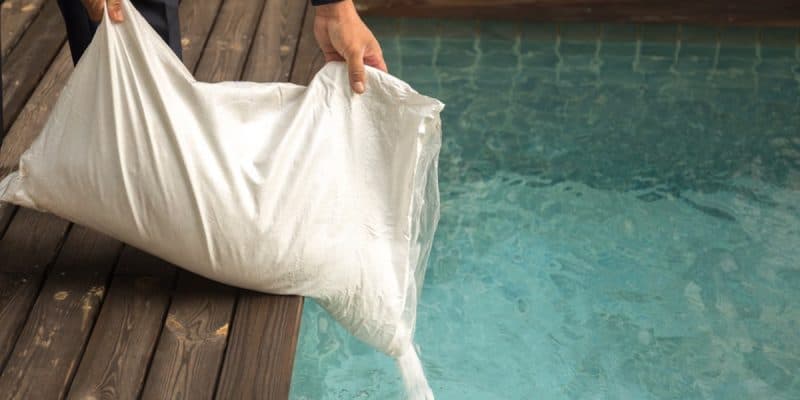
Chlorine can irritate the skin and eyes but it’s also hazardous to handle and store. It’s a no brainer that many people have opted for salt water pools, which has some big advantages over chlorine pools. Salt water pools are not always the perfect choice as they do have some downsides that you need to consider before going with one. However, below we have put together pros and cons to salt water pools.
Advantages of Salt Water Pools
Low Maintenance. First, a salt water pool requires low maintenance. You can have the peace and mind of leaving your pool for a couple of weeks and not have to worry about green algae growing in the water. The latest salt water equipment are able to automatically clean the pool water without any monitoring.
Gentle on Your Skin. Second, swimming pools that use salt water equipment are less damaging to the skin due to the significantly lower chlorine in the water. People who suffer from allergies or have very sensitive skin will not have any issues when they go swimming in this type of swimming pool.
Low Chlorine Levels. Third, the water in a salt water pool has significantly less chlorine to a regular swimming pool. This is due to you not having to physically add chlorine to the pool because salt water pool systems convert salt into chlorine automatically.
Low Salt Levels. Finally, though they are called salt water pools, the water has lower amounts of salt compared to ocean water. Fun fact, your tears has the same amount of salt as the salt water pool has. This is why you can safely swim with your eyes open underwater. Also, swimming in salt can make your skin feel softer and smoother.
Disadvantages of Salt Water Pools
Electricity Use. First, even though with has less maintenance, salt water pools require electricity for the chlorine generator to work. An average 20,000-gallon salt water pool will require about 500 watts of power. Your electricity cost will be a little bit higher compared to a normal pool.
Wear and Tear. Second, many owners complain that their pool parts and equipment get damaged by the salt content in the water. The constant presence of salt over time can ruin underwater lights, pool liners and even the masonry work done in the pool.
Salt Damage to Plants. Third, the wastewater or backwash that comes from the use of the salt water pool can be known to kill plants and make the soil lose nutrients over time. Salt water pools have been linked to crop damage in some parts of Australia and even some areas in the United States. Some American neighborhoods prohibit the use of salt water swimming pools. So you will need to check with your local neighborhood and county to see if they prohibit salt water pools.
Initial Investment. Lastly, one of the major downsides is it costs significantly more to install due to traditional pool. You will be paying more upfront but in the long run, you will be saving money due to not having to buy chlorine. Investing in a quality salt water system or chlorine generator is a must.
Are Salt Water Swimming Pools Better?
Many will say a saltwater pool isn’t better than chlorine pool because it is basically a chlorine pool. A saltwater pool with a saltwater generator will convert the pool salt into chlorine. It comes down to your personal preference, whether you have the saltwater pool maintain the chlorine for you or if you want to buy the chlorine in buckets to maintain a traditional pool.
Are Salt Water Pools Cheaper to Maintain?
The greatest benefit of having a salt water pool is the low pool maintenance. It’s no secret that salt water pools require more upfront due to the salt water equipment, which can set you back between $400 and $1,800 and $300 to $500 for the installation. Good news, you can recoupe your cost back in a few years due to not having to store day-to-day chemical needs for a traditional pool.
A salt water pool need less than $100 a year in salt and chemicals if maintained properly. On the other hand, a chlorine pool will cost between $300 to $800 per year in chemicals if maintained properly. Although you will save significantly on chemicals, the electricity cost of running salt water equipment will be slightly higher. It will cost approximately $30 to $50 more per year than a traditional pool pump.
In the long run, you will save more with a salt water pool due to not having to maintain the pool chemicals day-to-day.
Are Salt Water Pools Safe?
Are saltwater pools safe? Yes, a saltwater pool is safe as a traditional pool that is maintained with chlorine. Studies have shown the salt water systems may be safer than traditional pools due to not having to store and handle unsafe chemicals. Studies have also shown that regular use in heavily chlorinated swimming pools could cause long-term risk.
Do Salt Water Pools Kill Bacteria?
Do salt water pools kill bacteria? Yes, saltwater pools can kill bacteria due to chlorine. Yes, that’s right, saltwater pools still use chlorine to kill the bacteria in the pool water. Chlorine has been the most common way to kill bacteria and keep the pool sanitized since the 1900s. If you are not convinced, you can test your pool so you can swim with peace of mind.
How Much Salt Does My Pool Need?

How much salt do you add? The amount of salt your pool needs requires the level of salt need for your salt chlorine generator to function. Check the manual or manufacturer’s website to find this amount, it usually ranges between 3,000 to 4,000 ppm (parts per millions).
The total number of gallons in your swimming pool and it’s the current state of salt levels determine how much salt you need to add. You can use a salt water test kit to find out the pool’s current salt level, then you can calculate how much salt to need based on your pool size in gallons with a salt table, then subtract the current salt level (you must go off your generator manual salt table).
So an example would be, a 20,000-gallon swimming pool with a salt level of 500 Pmm would require 501 pounds of salt.
Does Swimming in a Salt Water Pool Burn More Calories?
Swimming in a saltwater pool does not burn any more calories than a regular pool. But, swimming is still a great form of exercise. It does not matter which type of swimming pool you are swimming in, just make sure you take your safety into consideration. For instance, wear goggles to protect your eyes and avoid swallowing water.
Takeaway
If you can afford the extra upfront costs, a saltwater pool can offer many significant benefits that you wouldn’t get from a traditional chlorinated pool. When you come to decide, consider how often you and your family will use the pool, especially if you live in an area with seasonality.

